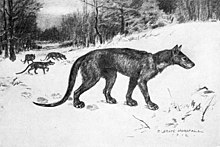Daphoenodon is an extinct genus of terrestrial carnivore, which lived in the early Miocene and belonged to the family Amphicyonidae ("bear dogs") of the suborder Caniformia.[1] The species of Daphoenodon are characterized by limbs that are specialized in fore and aft movement, as well as a body alignment that results in a lengthened stride.[2]
| Daphoenodon Temporal range: Early - Middle Miocene
| |
|---|---|

| |
| D. superbus skeleton | |
| Scientific classification | |
| Domain: | Eukaryota |
| Kingdom: | Animalia |
| Phylum: | Chordata |
| Class: | Mammalia |
| Order: | Carnivora |
| Family: | †Amphicyonidae |
| Subfamily: | †Daphoeninae |
| Genus: | †Daphoenodon Peterson 1909 |
| Species | |
| |
| Synonyms | |
|
Borocyon | |


Species
editD. falkenbachi was a larger species that was found in northern Goshen, southeastern Platte Counties, Wyoming, and Nebraska. A smaller species, D. skinneri, was found in southern Wyoming.[1] In one large species, D. robustum, the forelimb is elongated, making the adaptation for pursuing prey over open terrain very evident. The skeletal structure of D. robustum shows a predator that shares characteristics with highly evolved modern species—wolves and cheetahs—as well as large ambush wild cats (felids)—lions and tigers.[2]
References
edit- ^ a b Hunt, R. M. (2002). "New Amphicyonid Carnivorans (Mammalia, Daphoeninae) from the Early Miocene of Southeastern Wyoming". American Museum Novitates (385): 1–41. doi:10.1206/0003-0082(2002)385<0001:NACMDF>2.0.CO;2.
- ^ a b Hunt, R. M. (2009). "Long-Legged Pursuit Carnivorans (Amphicyonidae, Daphoeninae) from the Early Miocene of North America". Bulletin of the American Museum of Natural History. 318: 1–95.